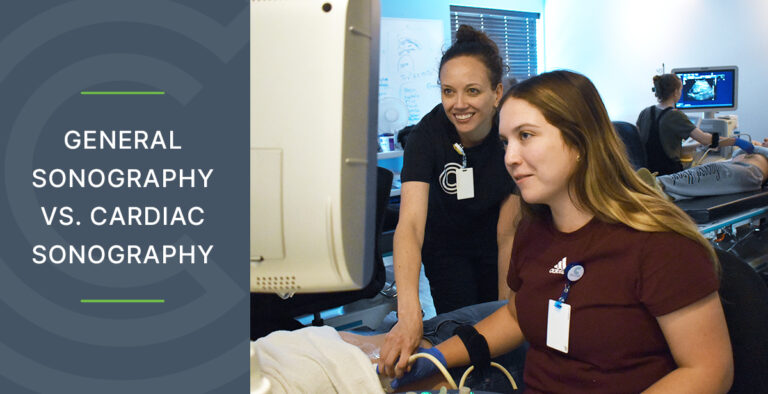Sonography or ultrasound imaging, is a valuable diagnostic tool used in various medical specialties to visualize internal organs, tissues, and blood flow patterns. The two common fields of sonography are general sonography and cardiac sonography. While both involve ultrasound technology, they focus on different areas of the body and serve distinct purposes. In this blog post, we’ll compare general and cardiac sonography, highlighting their key differences and career prospects.
Focus Area
The primary difference between general and cardiac sonography lies in their focus areas. General sonography, also known as diagnostic medical sonography, involves imaging the abdomen, pelvis, and reproductive organs. General sonographers use ultrasound technology to assess organs and detect abnormalities, such as tumors, cysts, or organ damage.
On the other hand, cardiac sonography, also known as echocardiography, focuses on imaging the heart and its surrounding structures. Cardiac sonographers assess cardiac function, evaluate heart valves and chambers, and diagnose cardiovascular conditions, such as heart disease or congenital defects.
Scope of Practice
General and cardiac sonographers perform different types of ultrasound examinations based on their respective specialties. General sonographers may conduct abdominal scans to assess the liver, kidneys, pancreas, or gallbladder, pelvic scans to evaluate the uterus, ovaries, or prostate, and obstetric scans to monitor fetal development during pregnancy.
In contrast, cardiac sonographers specialize in performing echocardiograms to assess cardiac anatomy, function, and blood flow. They may also perform stress echocardiograms or transesophageal echocardiograms for a more detailed evaluation of cardiac function and structure.
Patient Population
Another difference between general and cardiac sonography lies in the patient populations they serve. General sonographers may work with patients of all ages and genders, performing a wide range of ultrasound examinations to diagnose various medical conditions. They may interact with pregnant women, pediatric patients, adult patients, and elderly patients, depending on the type of examination being performed.
Cardiac sonographers primarily work with adult patients who have cardiovascular concerns or conditions. They collaborate closely with cardiologists and other members of the cardiac care team to provide diagnostic imaging and monitor cardiac health.
Career Opportunities
Both general and cardiac sonography offer career opportunities in healthcare. Graduates of general sonography programs may pursue careers as diagnostic medical sonographers in hospitals, imaging centers, clinics, or physician offices. They may specialize in abdominal sonography, obstetric and gynecologic sonography, or vascular sonography, depending on their interests.
Graduates of cardiac sonography programs may work as cardiac sonographers in hospitals, cardiac clinics, cardiovascular centers, or cardiac catheterization laboratories. They may specialize in adult echocardiography, pediatric echocardiography, or fetal echocardiography, depending on their training and certification.
Training and Education
Both general and cardiac sonographers require specialized training and education to enter the field. General sonography programs typically include coursework in anatomy, physiology, ultrasound physics, and medical imaging techniques, along with clinical practicum experiences in various specialty areas.
Similarly, cardiac sonography programs cover topics such as cardiac anatomy and physiology, echocardiography principles, cardiovascular pathology, and patient care skills. Clinical rotations in cardiac imaging labs or healthcare facilities provide hands-on experience performing echocardiograms and working with patients under the supervision of experienced sonographers and cardiologists.
General and cardiac sonography are two distinct specialties within the field of diagnostic imaging, each offering unique opportunities in the healthcare industry. If you’re interested in pursuing a career in general diagnostics sonography or cardiac sonography, Caris College provides comprehensive training programs to help you achieve your goals. Visit Caris College today to learn more about our sonography programs and take the first step towards a healthcare career.
More on cardiac sonography vs general sonography
